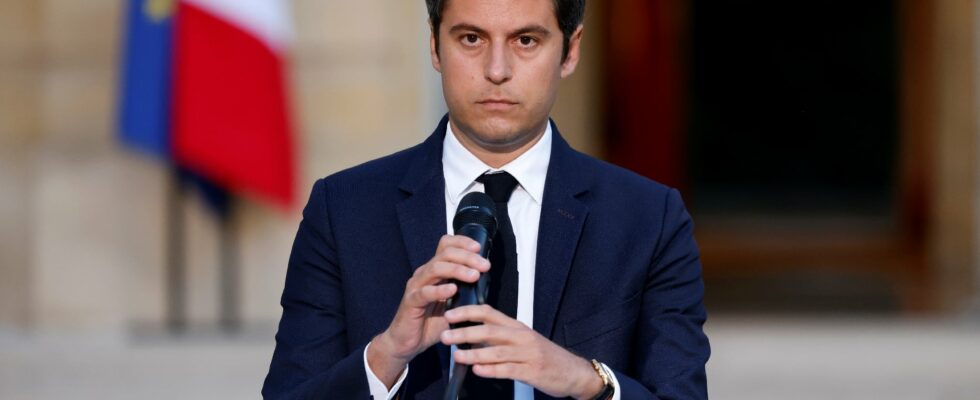It was unofficial, it is now official. Gabriel Attal will chair the Renaissance group of deputies in the National Assembly. The young wolf of Macronism received the approval of 84 deputies out of 98 registered in the presidential camp group during a vote held on Saturday, July 13. An expected result: the new deputy from Vanves was the only one to have filed an official candidacy the day before. Gérald Darmanin and Elisabeth Borne, who also had their eye on the position, had ultimately given up on crossing swords with the Prime Minister.
Because yes, at the moment, Gabriel Attal is still the head of the full government. His resignation presented to Emmanuel Macron the day after the second round of the legislative elections was refused by the President of the Republic, who wanted to keep him at Matignon “for the time being”, in order to “ensure the stability of the country”. Result: he is at the same time Prime Minister, deputy and leader of a political group in the National Assembly.
Enough to attract sermons from the opposition. Invited onto the CNews set this Monday, July 15, Manon Aubry described this situation as “gross”, denouncing a “mixture between the legislative and executive”.
Legal loopholes
And for good reason, in application of the principle enshrined in Article 23 of the Constitution, “the functions of member of the government are incompatible with the exercise of any parliamentary mandate”. It is therefore not possible, in theory, to be both a minister and a member of parliament. “But be careful, there are the texts, and there is practice”, underlines Anne Levade, professor of public law at the University of Paris 1 Panthéon-Sorbonne. Especially since political-institutional history has demonstrated it on many occasions: politics sometimes twists the neck of written rules.
This was the case, for example, in 1967 and 1988. While the presidential camp had a majority – a fragile absolute majority at the end of the 1960s, and a relative majority under Mitterrand – the deputies who held positions within the government were still able to vote in the election of the President of the National Assembly. With one nuance, however, and not the least: in both cases, these were resigning governments. Which means that a decree terminating the functions of the government had been signed by the President of the Republic, and that the functions of the ministers were limited to the dispatch of current affairs. Which is not the case to date.
Towards a resigning government
“For the moment, this configuration does not pose a real problem, since the ministers elected as deputies and Gabriel Attal have not yet had to sit in Parliament,” says Thomas Clay, professor of law at the Sorbonne. Thus, in the event that a decree terminating the government’s functions is signed by Emmanuel Macron by July 17, the day before the first public session, “the members of the government elected as deputies will be able, inspired by the practice of 1967 and 1988, to participate in the election of the president of the National Assembly,” confirms Anne Levade.
It remains to be seen whether the practice will be well received by other political groups. At the end of the 1980s, the opposition had not sought to thwart the presidential majority’s maneuver. For one reason perhaps: “There was no body capable of noting the lack of awareness of the incompatibility of the two functions, with the exception of the President of the Assembly, who could refer the matter to the Constitutional Council.” And none seem to be nearly forty years later. All the more reason for the master of clocks to accept the resignation of Gabriel Attal, this “little brother” to whom he gave the keys to Matignon last January, and who could well be the last one he will have chosen.
